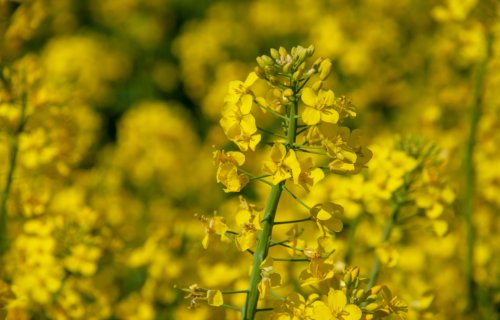HALLE, Germany — Plant-based meats are growing in popularity for people looking to cut back on the real thing and opt for healthy, but just as tasty alternatives. Many of these products use soy protein, but plenty of people are either allergic to soy or simply prefer other proteins. Now, researchers say dieters and vegans in search of a tasty soy-free plant-based meal could soon be chomping away at rapeseed burgers.
The bright yellow rapeseed plant, which is a member of the cabbage family, has the potential to replace popular soy products as the best plant-based source of protein, nutrition scientists found. Its natural mustard flavor means it could be perfect for making savory foods such as vegan burgers and sausages rather than sweet treats.
Researchers also say the health benefits of eating rapeseed are comparable to those of soy in terms of its effects on the metabolism. Products containing the plant could fill you up for longer, according to their study. “The rapeseed protein induced comparable effects on metabolic parameters and cardiovascular risk factors as soy protein,” says professor Christin Volk, a nutritionist of Martin-Luther-Universitat (MLU) in Germany, in a university release.
Humans need protein for a balanced and healthy diet and meat and fish are considered important high-quality sources. But certain plants can also provide valuable proteins, including soy and now potentially rapeseed.
“It contains essential amino acids which can not be synthesised in the body,” says study co-author and MLU professor Gabriele Stangl. “Soy is generally considered the best source of plant protein as it contains a particularly beneficial composition of amino acids.”
It also contains phytochemicals – chemical compounds produced by plants – which could have beneficial effects on health.
In comparison to soy, rapeseed has several other advantages too. It is already being cultivated in Europe and the protein-rich byproducts of the rapeseed oil production could be used as ingredients for new food products. These byproducts are currently used exclusively for animal feed.
Rapeseed protein keeps people feeling more full than soy
For their study, Stangl and her team investigated the effect of ingested rapeseed and soy proteins on human metabolism. “So far, only a few data on the effect of rapeseed protein intake in humans had been available,” Stangl notes.
Twenty participants were recruited for the experiment. Before their test began, the participants were asked to document their diets for a few days. Then they were invited to eat a specifically prepared meal on three separate days that either contained no additional protein, or was enriched with soy or rapeseed protein. After the meal, blood was regularly drawn from the participants over a six-hour period.
“By using this study design, we were able to assess the acute metabolic response of each study participants to the dietary treatments,” explains Stangl.
The researchers found that rapeseed protein consumption has comparable beneficial effects on human metabolism as soy protein. The glucose metabolism and satiety were even better as participants felt full longer after eating the rapeseed protein.
“Rapeseed even produced a slightly more beneficial insulin response in the body,” says Volk. “To conclude, rapeseed appears to be a valuable alternative to soy in the human diet.”
SWNS writer Laura Sharman contributed to this report.
